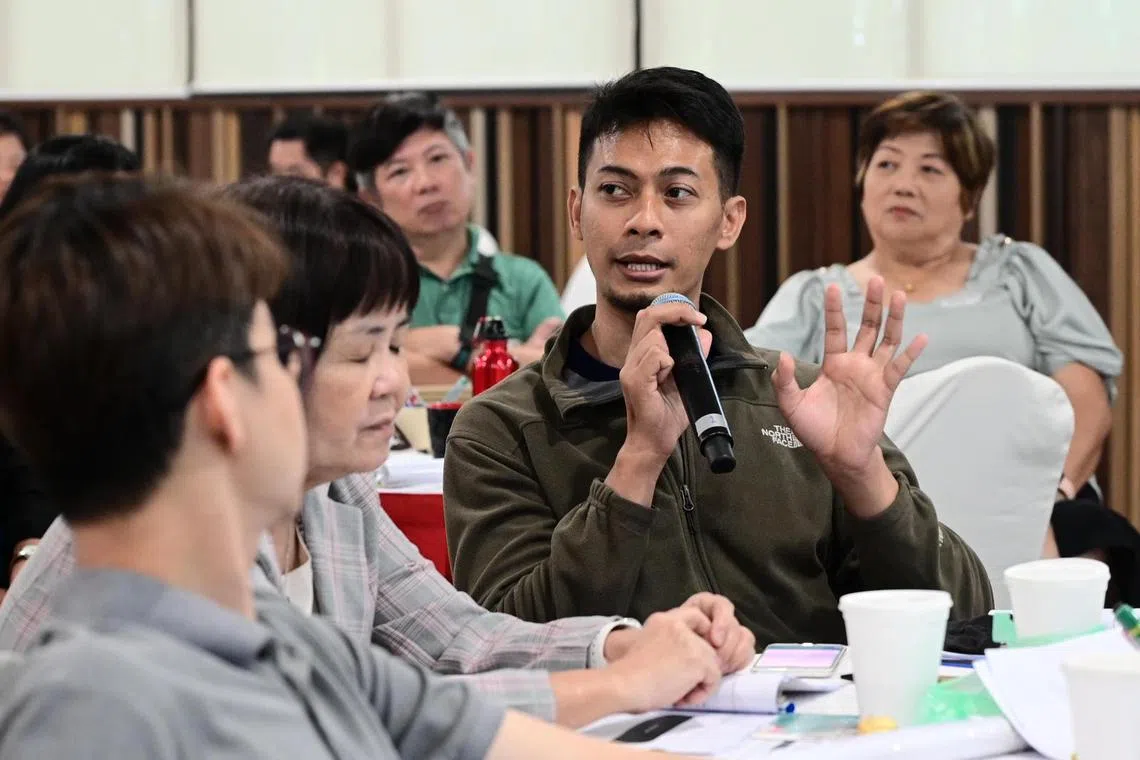36 grassroots leaders in North West District trained to spot residents with mental health struggles
Sign up now: Get ST's newsletters delivered to your inbox

Grassroots leaders in the North West district like Mr Muhammad Haizuruldin Gimin (centre) are being trained to engage residents with mental health struggles.
PHOTO: NORTH WEST COMMUNITY DEVELOPMENT COUNCIL
Follow topic:
SINGAPORE – When faced with a resident struggling with mental health, grassroots leader Alvin Ragavan Reggie usually offers a listening ear but is worried about saying the wrong thing.
Under a new initiative to train grassroots leaders to be mental wellness ambassadors in the North West District, he will undergo training on how to identify and engage residents facing mental health issues, offering a first layer of support to ensure they have access to the relevant services early.
Mr Alvin is among 36 people trained in this first round of the initiative – run by North West Community Development Council (NWCDC) – which was officially launched on Saturday with an appointment ceremony and the first training session.
These ambassadors will cover the 19 divisions in the district.
North West District mayor Alex Yam said: “The mental wellness ambassadors, when engaging such residents who may be facing mental wellness issues during their regular house visits and chit-chat sessions at community events, can promptly offer a first layer of support through giving basic advice.”
The Marsiling-Yew Tee GRC MP added that if they assess that the resident may need further help, “he or she will be referred to partners within the CDC’s support network immediately”.
Mr Alvin, a pastor, said he hopes that through the training, he can pick up signs that residents are facing mental stress, and quickly refer them for help.
“Some of them have lost jobs, some of them had separation issues with families not visiting each other during the pandemic... all these affected their minds in a way that once the Covid-19 restrictions were lifted, there was still some mental strain,” said the 46-year-old.
Mr Alvin serves in the Canberra division, where he interacts with residents through regular house visits and constituency-wide events.
The Mental Wellness @ North West programme includes a support network comprising grassroots organisations, social service agencies, schools and healthcare providers.
The ambassadors will undergo training by Care Corner, one of the network members, on basic mental wellness knowledge and communication techniques.
Throughout their two-year appointment, they can go for advanced training and refresher courses.
Other efforts by NWCDC to promote mental wellness include its partnership with PsyConnect, a psychology student interest group comprising undergraduates and alumni from the Singapore University of Social Sciences, to design and develop a toolkit.
The latter is meant to provide a guide for caregivers and residents affected by milder mental wellness conditions to self-help and manage their loved ones or their own situations.
It also consolidates the various avenues and resources available in the North West District. The ambassadors can use it for reference or share it with residents. The toolkit is available at go.gov.sg/nw-mw
Another newly appointed ambassador is Mr Muhammad Haizuruldin Gimin, 40, a student development officer. Due to his work, he is no stranger to conversations about mental health.
“I can transfer the skills that I’ve picked up already, such as on suicide awareness or how to manage students who are more emotionally strained, and how to refer them to appropriate help,” he said.
As a grassroots leader in Bukit Panjang and Yew Tee, he steps in with the Community Emergency and Engagement Committee to support residents after they have experienced difficult situations such as losing their homes in a fire.
“I hope that with this training, we can help create an environment or organise events to minimise the taboo around seeking professional mental health help, and so more residents are not afraid to come out and talk about it,” he added.
The topic of mental health was cast into the spotlight amid the Covid-19 pandemic.
A study by the Institute of Mental Health conducted between May 2020 and June 2021 found that around 13 per cent of more than 1,000 participants reported symptoms of anxiety or depression during the pandemic.


